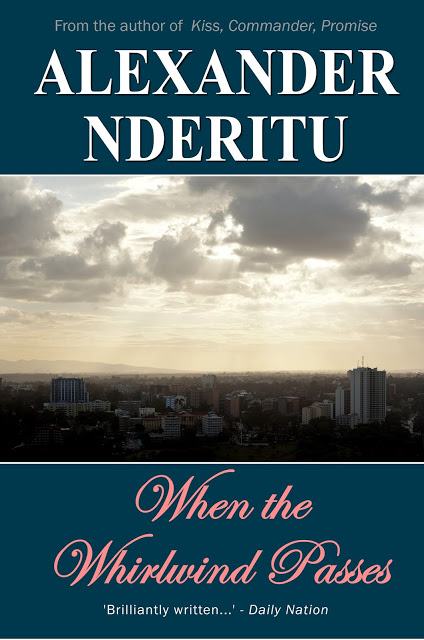‘Emotions are running high because the publishing industry is being radically reshaped by the same disruptive forces that have transformed all sorts of industries from travel and insurance to newspapers and music. Change is scary, and the publishing industry is changing at light-speed. If you want a parallel with music, I think it’s akin to going from vinyl straight to MP3.’ – Author JJ Marsh, ‘The Industry View – Amazon vs Hachette’

In November 2001, a young Kenyan novelist with a background in IT published a novel entitled, ‘When the Whirlwind Passes’ online. This made it arguably Africa’s first e-novel and the author, Alexander Nderitu, has since published three more e-books and gained literary recognition. In November 2016, ‘When the Whirlwind Passes’ clocked 15 years of existence. To celebrate, the crime/suspense novel has been re-issued, with a new cover, new ISBN number, and various edits.

About the new edition:
Plot summary: A red-hot romance between a young fashion dynasty heir and a ghetto princess leads up the murder case of the decade.
Category: General Fiction
Size: 166 pages
Cost: USD$ 5.00 (e-book), USD 12.50 (paperback), Kshs 150.00 (in Kenya)
Format: Print (via POD), Adobe PDF, E-PUB, Amazon AZW, et al.
Distribution: Author’s official website (AlexanderNderitu.com) and Lulu.com
Lulu.com (Print): http://www.lulu.com/shop/alexander-nderitu/when-the-whirlwind-passes/paperback/product-22958418.html
Lulu.com (e-book): http://www.lulu.com/content/e-book/when-the-whirlwind-passes/19952784
Kenyan e-book: http://www.alexandernderitu.com/buy/whirlwind.html
Author video link: https://www.youtube.com/watch?v=YFgC5J5uqZM
Author photos link: http://alexandernderitu.blogspot.co.ke/2016/11/alexander-nderitu-photos.html
The literary landscape has changed drastically over the last 15 years. Some of the outstanding changes include:
E-readers like the Amazon Kindle and the Barnes & Noble Nook have revolutionized the reading experience. A typical e-reader can hold hundreds of books – a virtual library – and weigh less than the average paperback.
Publishers and booksellers of digital books have mushroomed – as have online bookstores (that may deal in physical books, but are themselves virtual).
Print-On-Demand (POD) technology has bridged the gap between e-books and physical books. If a reader wants a print version of an e-book on a platform like Lulu.com or Amazon CreateSpace, then they can pay in advance and the book will be manufactured and sent to them.
Young writers have taken to the Internet like ducks to water. Internet and social media have become the place to share and promote one’s work and events, as well as get the latest literary news and gossip.
Bloggers have become the new literary critics. Blogs dedicated to African literature include BrittlePaper and AfricanWriter.com. Some authors also double up as bloggers and engage in literary criticism, review or promotion:
‘With the shift to digital, reaching out to amateur and professional bloggers seems like a natural evolution in the way we market books.’ – http://canadianmags.blogspot.co.ke, ‘Penguin Canada recruiting bloggers to review its books’ (article)




